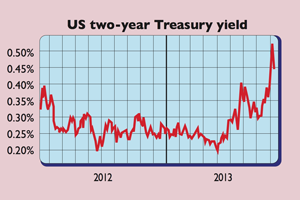Get the latest financial news, insights and expert analysis from our award-winning MoneyWeek team, to help you understand what really matters when it comes to your finances.
You are now subscribed
Your newsletter sign-up was successful
Want to add more newsletters?

Twice daily
MoneyWeek
Get the latest financial news, insights and expert analysis from our award-winning MoneyWeek team, to help you understand what really matters when it comes to your finances.

Four times a week
Look After My Bills
Sign up to our free money-saving newsletter, filled with the latest news and expert advice to help you find the best tips and deals for managing your bills. Start saving today!
Last Friday's American payrolls report was a "cold shower" for those who hoped the US economy was finally accelerating, says The Wall Street Journal. Just 169,000 jobs were created in August and the previous two months' payroll gains were revised down. The unemployment rate declined to 7.3%, but only because a record number of people gave up looking for work and left the labour force.
The August employment report was especially important, as it was the last major statistical release before the US Federal Reserve meeting on 18 September. At this meeting, the Fed is supposed to decide whether to embark on tapering' quantitative easing (QE) reducing the quantity of various bonds it buys with printed money. Next year, with unemployment around 7%, it will end QE altogether, it has suggested. Now, given the disappointing employment data, some are wondering whether the central bank might stay its hand.
Having announced a taper already, it is still likely to go ahead, reckoned former Fed vice-chairman Donald Kohn, "complete with caveats about how it could be reversed and how it doesn't imply anything about when rates will be raised".
MoneyWeek
Subscribe to MoneyWeek today and get your first six magazine issues absolutely FREE

Sign up to Money Morning
Don't miss the latest investment and personal finances news, market analysis, plus money-saving tips with our free twice-daily newsletter
Don't miss the latest investment and personal finances news, market analysis, plus money-saving tips with our free twice-daily newsletter

Such higher long-term rates in the market have already tightened monetary policy, says Randall W Forsyth in Barron's. American mortgage rates, for instance, are priced off US Treasuries. Mortgage applications have slumped and new house sales "are beginning to buckle". So one major worry is that central banks could have lost control of interest rates and monetary tightening even before they start trying to reduce the pace of monetary loosening. And due to the poor jobs data, the pace and nature of the latter move has become more unpredictable than before. All of which, says John Authers in the FT, leaves investors with "the kind of nasty uncertainty" that can lead to "financial accidents".
Get the latest financial news, insights and expert analysis from our award-winning MoneyWeek team, to help you understand what really matters when it comes to your finances.
MoneyWeek is written by a team of experienced and award-winning journalists, plus expert columnists. As well as daily digital news and features, MoneyWeek also publishes a weekly magazine, covering investing and personal finance. From share tips, pensions, gold to practical investment tips - we provide a round-up to help you make money and keep it.
-
 Should you buy an active ETF?
Should you buy an active ETF?ETFs are often mischaracterised as passive products, but they can be a convenient way to add active management to your portfolio
-
 Power up your pension before 5 April – easy ways to save before the tax year end
Power up your pension before 5 April – easy ways to save before the tax year endWith the end of the tax year looming, pension savers currently have a window to review and maximise what’s going into their retirement funds – we look at how

